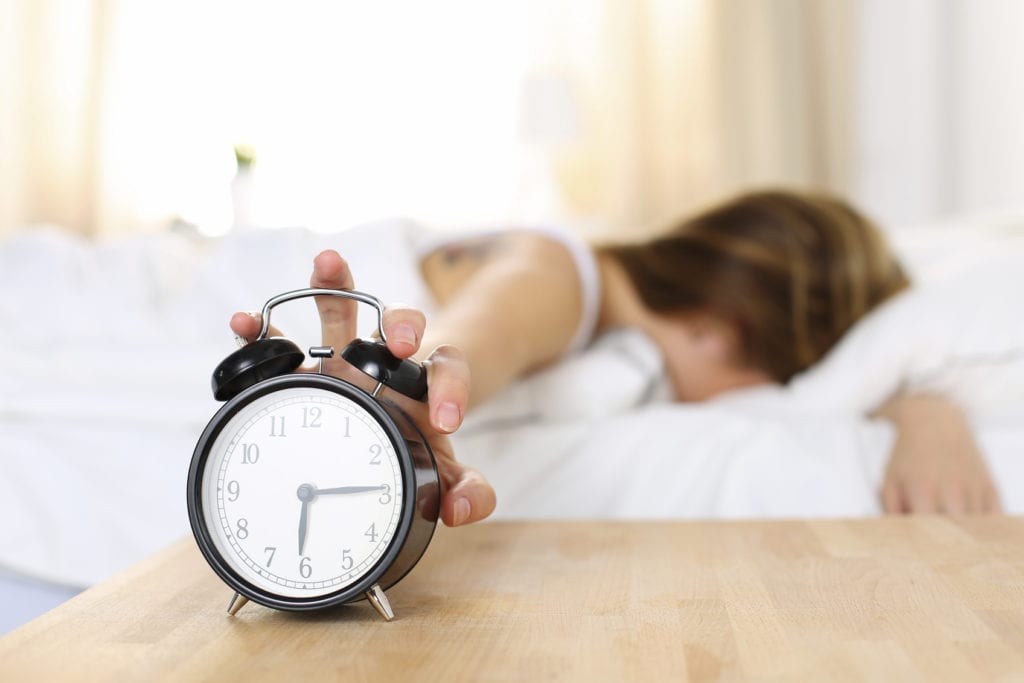
You’ve recently started making changes to your eating habits. You’re eating less processed foods and sugar, more vegetables and, overall, choosing more whole foods. You’ve also kicked the exercise up a notch, and started weight training, HIIT sessions and more active outings with your friends and family. Your weight, however, refuses to budge. Why?
For a significant number of our clients, inadequate sleep may be to blame. You might be doing all the right things from a food and exercise perspective, but if you’re not getting good quality, adequate sleep, then your weight loss may be slow or non-existent.
Sleep? How could that possibly affect your ability to lose weight? Surely if you’re busy and spend less time lying around, you’re burning more energy, right? No, it’s actually not the case at all. A healthy, happy life is the combination of working hard and getting adequate rest.
Here’s why:
Sleep is a basic human function that we all do every single day. Sleeping adequately each night is vital for both good health and productivity in our day-to-day lives. Insufficient sleep results in the obvious symptoms of becoming excessively sleepy throughout the day and experiencing a decrease in neuro-cognitive function – the ability to make decisions and concentrate. Further research into sleep deprivation, however, suggests that it may lead to more serious health problems such as premature death, cardiovascular disease and the development of diabetes. There are a number of studies that link sleep duration to blood pressure, blood glucose levels, stress hormone levels, immune function, metabolic function and much more. It’s a pretty important part of our daily routine.
Good weight loss is the result of creating an energy deficit (less energy in from food vs more energy out through exercise) and maintaining stable blood sugar levels. One of the most surprising points that I discovered when researching sleep, is that along with reducing our ability to regulate our blood sugar levels, insufficient sleep may also affect the part of the brain involved in your appetite, causing you to eat more food throughout the day. This is the reason why weight loss becomes difficult when you’re not getting adequate sleep. I’ve certainly observed this over the years with shift workers and sleep deprived mums.
Various research indicates that a lot of us are sleeping less and when we do sleep, it’s poorer quality. When you think about our current lifestyle this is not surprising at all. We have more demanding jobs, with a higher rate of shift-work style positions. We’re managing multiple, competing priorities between work and home and modern technology means that we can be contacted or connected to the internet 24-7.
How much should we be sleeping?
The amount of sleep that we need is different for everyone, however, the health benefits that come from adequate sleep are seen in people who get eight or more hours per night. If this isn’t possible for you, even increasing your sleep duration from what it is now, will offer you benefits. Six hours is better than five and seven hours is better than six.
So how do we get more sleep?
Firstly, sleep needs to be prioritised as an important part of your self-care. See it as a means to an end. Better quality, longer sleep means a sharper mind, better work outcomes and higher energy levels throughout the day. Not too mention help your body recover and build muscle after your weight training sessions and put you in a good position to burn fat.
Secondly, we need to reduce our daily screen time. Research shows that we’re spending more and more time on our computers or other devices, surfing the internet or watching TV. More time spent doing these activities means less time for sleeping.
Thirdly, we need to establish consistent daily routines. Unless you have an underlying condition that makes sleeping difficult, many sleep problems can be solved through establishing appropriate daily habits and rituals. Rituals like always waking at the same time each morning, or following the same pattern in the evening before bed helps your body sleep better through the night.
So you’re not getting enough sleep, what should you do about it?
Here are some quick tips to help you develop better daily sleeping patterns:
- Watch your caffeine intake. Too much caffeine results in decreased sleep duration and quality – aim for no more than the equivalent of two single shot espresso coffees per day.
- Limit screen time in the hour before going to sleep. The lights from these devices (phones, tablets, computers, TV) can be over stimulating and make it more difficult to fall asleep.
- Re-evaluate your workload. Research shows that people working two or more jobs are more likely to report poor sleep quality and increased sleepiness throughout the day.
- Bring a good book to bed. Reading a good old paperback before sleeping will help you wind down and relax. As you start to feel sleepy, put the book down and catch your sleep wave.
- Dim the lights in your house during the evening. Bright lights are stimulating. As lights dim, a sleep hormone, melatonin, is released in the brain, which signals your body that it’s time to sleep.
If you’re still having trouble with your sleep duration and/or quality, it’s worth chatting to your doctor about it and getting further help.
If you’d like further help with your nutrition please click below:



